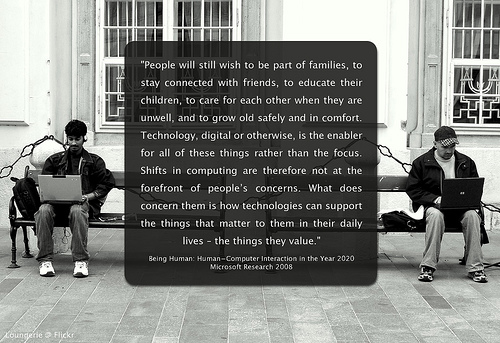These Kids "Get" Social Media
Ok, so they aren’t exactly “kids.” (I’m just getting old.) But I’ve been surprised and impressed by the intuitions many of my undergraduate students at LSU have brought to our Strategic Social Media #Manship4002 discussions. These senior public relations and mass communication students aren’t scholars of social media, but they “get” social media in ways that many scholars don’t. I let them have their own words here, so that we scientists and science communicators can learn from a younger generation not wringing hands over how to incorporate social media into their lives and work – they are simply living it.

“Growing virtual communities with stakeholders is not limited to 140 characters. There are many ways to bypass the reliance of short messages. Adding photos, videos, hashtags, Vines and shortened links to external sites all add endless opportunity to extend tweets.” - Madelyn Duhon
“I can only imagine what my mother’s tweets would be like if she created a Twitter account. A typical tweet would probably resemble, ‘Pilates and Zumba today with the wolf pack #HousewivesOfHarahan’ or ‘Making Miller Chicken tonight for Marc #HeOnlyEatsChicken #LawdGiveMeStrength.’ I don’t think the world needs to see my mother’s every thought that she would create into a tweet. If all parents decided to create Twitter handles, the younger generation will just turn to the newest social media app that parents haven’t caught on to. It will be a never-ending cycle of Hide and Seek with parents and social media.” – Daisy Miller
Storytelling through social media
“Why do we still tell our children the story of jolly old Saint Nicholas at Christmas time? And why does the entire American nation agree that Santa Claus is a plump, cheery old man residing in the North Pole with 12 reindeer and a bunch of elves and he comes down our chimney every December 25th to deliver presents under our tree? I’ll give you a hint: it’s not because it’s true. It’s because it’s a great story. A great story written by Washington Irving in 1809 under the pseudonym Diedrich Knickerbocker.” – Deandra De Napoli
“Things like blogs are giving ordinary people the power to tell their stories and have an audience, big or small, that is listening. Some stories fade into obscurity, but the ones that are especially interesting or impactful will spread like wildfire.” - Deandra De Napoli
“It is interesting to be amongst the first generations to fully realize the impact that social media has had. We were brought up in time of rapidly changing technology. Our generation got to see social media explode to its current level. It has almost seamlessly crept into every aspect of our lives. This is because it is only natural. We all want to fit it and be accepted. This is why we are now in the dawn of a new oral tradition; also know as the “digitoral” era. People who were once merely consumers now have the power to be players in the media realm. […]We finally have the power to craft our own messages. We are the storytellers once again. What story will we tell?” – Rhett Pritchard
"At first, I feared that social media sites - especially Twitter - would cause me to lose my roots in oral tradition, trading in the richness for an automated one. However, I have begun to realize that social media is just “plot mechanics” and the “characters” in the oral story we are all trying to tell. One is able to share their oral story with the aid of technology.” – Seth DiSalvo
These students really “get” how to grab people’s interest on Instagram – and it’s not all about ‘likes.’
“My social media campaign that relies primarily on audience interaction would flop. Instead of banking on the reply of my social media posts, I need to focus on the value and uniqueness of each post. Possible ways to grab my audience’s attention include posting videos, posting pictures of value to the audience and surprising them with the post’s context.” – Hayley Amoss
“While there is not a lot of scholarly research on Instagram it can be said that people use the outlet as way to capture and document fleeting moments in everyday life. Overall, Instagram is used as a storytelling device. More often than not, Instagram photos focus on the quality of the story over the quality of the picture.” – Elizabeth Garcia
A changing dialogue
“The use of social media in modern culture and daily life has become a vital part in the way people communicate. There are many uses for social media in this day and age: promoting company or personal brands, portraying messages, and sharing life stories. Gone are the days where people had to meet face-to-face in order to conduct in-depth conversations; there has now been a culture shift through the use of social media. Now we are effortlessly able to have intellectual conversations via social media e.g. (Facebook and Twitter).” – Bradley Williams
“Audiences [today] want truth and honesty and no longer want to accept superficial lull of advertisers.” – Amber Mason
We don’t need to be taught ‘social.’
“I feel like the generations before us should use our generation as a tool in learning how to use the networks, just as we use them to learn all of the skills of our future trades.” – Dylan Varnado
How does social media affect YOUR life? How do you see it changing the way we communicate? Leave comments below!
